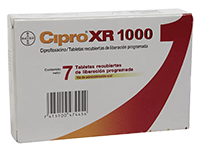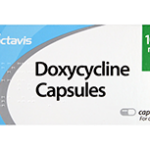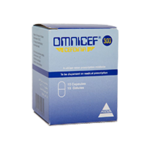
Cipro

What is Cipro?
Cipro is an oral bactericidal agent used to treat infections of the respiratory tract, middle ear, urogenital, abdominal infections, skin and soft tissue infection, as well as bone and joint infections in adults and children above the age of 4.
What is Cipro used for?
The extensive use of Cipro has led to the rapid and increasing development of resistant bacteria (staphylococci, Pseudomonas and other Gram negative germs). In order to avoid the appearance of bacterial resistance, second choice antibiotics must be considered, to be used in a targeted way, reserving them for selected cases. They should not therefore replace the standard treatments available in the most common infections (eg broad-spectrum penicillins and macrolides in respiratory infections, co-trimoxazole in urinary infections).
How does Cipro work?

Ciprofloxacin is a fluoroquinolone derivative introduced in therapy in the late 1980s. In its structure there is a cyclopropyl substituent on N1 which, together with the fluorine atom and the piperazine ring, contributes significantly to its antibacterial activity.
Ciprofloxacin has amphoteric properties. At physiological pH it prevails as zwitterion and this characteristic favors its passive diffusion through the envelope of bacteria. Fluoroquinolones are a class of antibacterial drugs widely used due to their effectiveness, broad spectrum of action, excellent pharmacokinetics and acceptable handling.
The development of this class began in the early 1960s with the introduction of nalidixic acid, a synthetic antibacterial indicated exclusively in uncomplicated urinary infections caused by gram-negative bacteria. Over the last 40 years there have been several “generations” of quinolones chemically modified with respect to nalidixic acid and with improved pharmacological characteristics.
How long does Cipro stay in your system?
Ciprofloxacin is rapidly eliminated by the kidneys and metabolized mainly in the liver. The half-life of Cipro is estimated at 4 hours. You should drink sufficient amount of fluids to help your body eliminate the drug faster and avoid eventual toxicity that may build up if you experience dehydration while on ciprofloxacin therapy.
Precautions
Patients Cipro should be used with caution in the following groups of patients:
- Asthmatics being treated with theophylline (risk of convulsions and other undesirable effects due to the overdose of theophylline)
- Patients receiving NSAIDs (increased risk of convulsions)
- Elderly, patients with stroke outcomes, with brain organic changes (higher risk of side effects on the central nervous system)
- Subjects that carry out activities requiring vigilance and alertness (eg driving, operating machinery, working on scaffolding)
- Patients with myasthenia
- Subjects who, due to necessity or leisure, expose themselves to sunlight
Contraindications
Consider the following cases when Cipro is to be avoided:
- In pregnancy and lactation
- In pediatric age and in boys with incomplete skeletal development (in the animal studies ciprofloxacin caused damage to the articular cartilage in the organisms in development)
- In epileptics (risk of convulsions)
What are the side effects of Cipro?
Cipro belongs to the class of fluoroquinolones. Overall, these are generally well tolerated antibiotics. A review of 28 randomized, double-blind, controlled studies found that in 22 studies Cipro were similar to other comparative antibiotics in terms of incidence of undesirable effects and 5 were better tolerated.
Although it may slightly differentiate between incidences and types between one compound and another, the undesirable effects of Cipro are generally very similar and mainly involve the gastrointestinal system, the central nervous system, the skin and, to a lesser extent, the apparatus osteotendinous.
| System Affected | Symptoms |
|---|---|
| Gastro-Intestinal System | At the gastrointestinal level the most frequent disorders are nausea, dyspepsia, vomiting, abdominal pain, diarrhea. Cases of pseudomembranous colitis have rarely been reported. |
| CNS | Dizziness, headache, insomnia are the most common side effects of the central nervous system. Others, less frequent, include motor restlessness, tremors, anxiety, drowsiness; more rarely, nightmares, hallucinations, depression, convulsions and paresthesia are reported. Psychotic reactions are sporadic cases. |
| Integumentary System (Skin) | The undesirable skin effects consist mainly of erythema and exanthema and photosensitivity reactions. Very rarely cases of Stevens-Johnson syndrome and toxic epidermal necrosis have been observed. |
| Osteotendinous System | The use of Cipro has sometimes been associated with the appearance of pain and joint swelling. More recently, cases of tendonitis and partial or complete rupture of the Achilles tendon have been reported. Predisposing factors for tendon injuries are concomitant use of corticosteroids, advanced age and intense exercise. |
| Excrementory System | During treatment with Cipro, a transient increase in transaminases and alkaline phosphatase, cholestatic jaundice, hepatitis, as well as an increase in plasma urea, creatinine and bilirubin, together with crystalluria and hematuria are possible. Furthermore, there has rarely been reported impairment of taste and smell, visual disturbances (eg diplopia), tinnitus or temporary hearing loss, especially for high frequencies. As hypersensitivity reactions are possible rashes, fever, angioedema, arthralgia, myalgia and anaphylactic / anaphylactoid reactions. The rare hematologic effects are represented by eosinophilia, leukopenia and granulocytopenia. |
When Cipro should be suspended
- In the event of rash, fever or facial or laryngeal edema
- At the first signs of inflammation or pain in the Achilles tendon (putting the affected limb in complete rest until the symptoms have disappeared)
- In the event of severe and persistent diarrhea.
Where to buy Doxycycline over the counter?
Doxycycline is available in multiple forms as an OTC preparation produced by a large number of generic manufacturers. You will find the list of drug manufacturing companies and names under which you can find this antibiotic below. These drugs can be ordered online from e-pharmacies. Caution should be exercised every time you shop for healthcare items from an online vendor for the first time. Make sure that the drug distributor sells authentic medications; check for the name of drug manufacturer before sending items to your shopping cart. Scan the Terms and Conditions, as well as Privacy Policy practiced on the site.
Analogs
- Alcip – Allenge India
- Alcipro – Alkem Laboratories Ltd.
- Baycip – BAYER (INDIA) LTD
- C – Od GlaxoSmithKline Pharmaceuticals Ltd
- Cadiwin – Cadila Pharmaceuticals Ltd. (Genstar)
- Ceplox Mimec Pharma Pvt. Ltd.
- Cifran – Ranbaxy Laboratories Ltd. (Pharma)
- Cipgen – Cadila Pharmaceuticals Ltd. (Genstar)
- Ciplox – Cipla Limited
- Ciprind – Indoco Remedies Ltd.
- Ciprocore – Core Healthcare Ltd.
- Ciprofast – Invision Medi Sciences Pvt. Ltd. (Ikeirdorf)
- Ciprovar – Zota Pharmaceuticals Pvt. Ltd
- Cipven – Vensat Bio
- C-OD – Glaxo SmithKline Pharmaceuticals Ltd.
- Laxcip – Laksun Lifesciences
- Orpic Dey’s Medical Stores (Mfg) Ltd
- Probid – Active HC
- Quinobact – AHPL
- Seepro – Alobiote Healthcare
- Unicip-ER – United Biotech Pvt. Ltd.
- Wyserin – Wyeth Limited
- Zoxan – FDC Limited (Proxima)
Posted in Antibiotics
(1 voices, average: 5 of 5) 3778 views





















